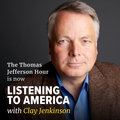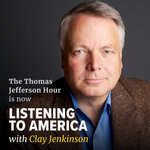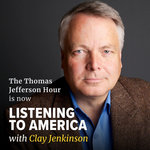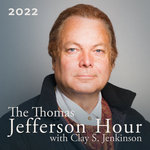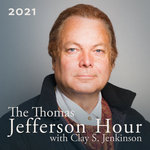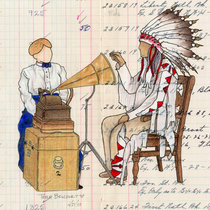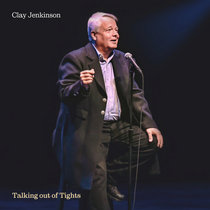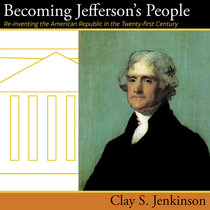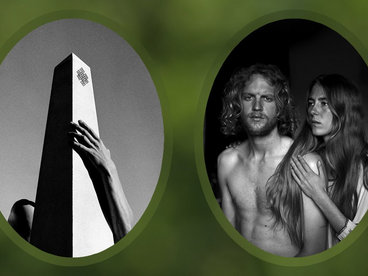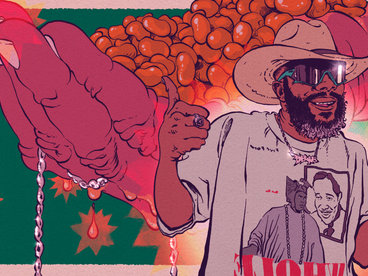
Other Explorations of the West
from What Would Thomas Jefferson Do? (2018) by Listening to America with Clay Jenkinson
1776 Club exclusive
-
1776 Club
Join now to receive all the new shows Listening to America with Clay Jenkinson creates, including 19 back-catalog releases, delivered instantly to you via the Bandcamp app for iOS and Android. You’ll also get access to supporter-only exclusives like this track. Learn more.Join Now $5 USD/month or more
about
DS: 00:00 Good day, citizens, and welcome to What Would Jefferson Do?, our weekly opportunity to discuss current American events with President Thomas Jefferson, who is seated across from me now. Good day to you, Mr Jefferson.
CSJ as TJ: 00:14 Good day to you, citizen.
DS: 00:15 Mr Jefferson, I'd like to present you a letter sent to you by one of your listeners. Mike Cox wrote in and he wants to know: besides authorizing the Lewis and Clark expedition, did you authorize any other explorations of the west and what were the results of those expeditions?
CSJ as TJ: 00:34 Well, first, I should say that I did not fully authorize Lewis and Clark. I suggested that Congress do so, and Congress did. Congress appropriated $2,500 as seed money for what I called the Lewis Expedition, and then also made it clear that our army posts at Harper's Ferry and elsewhere would cooperate with providing personnel and equipment and whatever else Lewis might need. The total costs of the expedition in the end was over $37,000. At any rate, that was the one that was closest to my own heart. Lewis was my friend, my protege. He lived with me in the White House for almost three years before his famous tour, but he wasn't the only one. I said this was just part of the canvas we were trying to begin to fill in. The canvas was the sort of white, empty Tabula Rasa beyond the Appalachian Mountains, and I wanted us to begin to fill it in with the arteries of the main rivers of America. So down in the southwest, two expeditions occurred during my presidency. One was Hunter and Dunbar, on the Washita River. Dunbar was a good friend of mine, although we never met. An expert in Indian sign language, but he knew a great deal about that part of the world and had scientific pretensions and credentials. So he undertook an expedition of the Washita and then Freeman and Custis, men who were surveyors, undertook an expedition on the Red River in Texas — in what's now Texas. And so the southwest, which was actually more important to the early development of this country than the northwest would become. We were exploring that, but not with the same immediate supervision that I showed in the case of Meriwether Lewis and then, in the West, in the northwest, the Zebulon Pike expeditions occurred. In 1805, Pike was at the Upper Mississippi River, same time that Lewis was in Montana. And Pike was searching for the source of the Mississippi and trying to ascertain what he could about the — that branch of the Great Mississippi Missouri System. He was somebody who is authorized by the United States army, not by me personally, but I was fascinated by what's Zebulon Pike was doing and discovering. And then the following year he traveled up the Arkansas River almost to its source in what's now Colorado. And then journey down into Texas where he was arrested by the way, by the Spanish authorities and marched all the way to Chihuahua. He was, as far as the Spanish were concerned, interloping on their sovereign lands. And they were very edgy about this. In fact, as perhaps, you know, they sent out three interceptive missions to try to cut off Lewis and Clark too, all of which failed. But they did catch up with Zebulon Pike. They did arrest him, they marched him overland into Mexico and after a period of time they marched him overland to the border between Texas and the United States.
DS: 03:44 Mr Jefferson, I know you had a great fascination with the west. However you yourself did not do a lot of exploration to the west.
CSJ as TJ: 03:53 I did not. I'm not much of a traveler. I never traveled more than 70 or so miles west of my birthplace.
DS: 03:59 Well, did this fascination have something to do with these explorations that you're telling us about?
CSJ as TJ: 04:05 Yes. My father was something of an explorer.
DS: 04:07 Or was it commerce?
CSJ as TJ: 04:09 Well, commerce is the way that I justified these expeditions to Congress because Congress, under our constitution, does not have the power to do literary or scientific things. But the commerce clause of the constitution is quite clear. So when I went to Congress to get authorization for this sort of thing, I did so under the guise, under the umbrella of the commerce clause. And Commerce certainly was one of my interests, and we were trying to get into the fur trade and the China trade. And that's what Mr Lewis was doing by way of his search for the northwest passage, but my interests were much more grounded in the enlightenment than they were in commerce per se. But commerce gave me a very useful tool by which to persuade a somewhat parsimonious Congress to fund this and other expeditions.
DS: 04:55 Thank you very much, Mr Jefferson.
CSJ as TJ: 04:57 You are welcome, sir.
CSJ as TJ: 00:14 Good day to you, citizen.
DS: 00:15 Mr Jefferson, I'd like to present you a letter sent to you by one of your listeners. Mike Cox wrote in and he wants to know: besides authorizing the Lewis and Clark expedition, did you authorize any other explorations of the west and what were the results of those expeditions?
CSJ as TJ: 00:34 Well, first, I should say that I did not fully authorize Lewis and Clark. I suggested that Congress do so, and Congress did. Congress appropriated $2,500 as seed money for what I called the Lewis Expedition, and then also made it clear that our army posts at Harper's Ferry and elsewhere would cooperate with providing personnel and equipment and whatever else Lewis might need. The total costs of the expedition in the end was over $37,000. At any rate, that was the one that was closest to my own heart. Lewis was my friend, my protege. He lived with me in the White House for almost three years before his famous tour, but he wasn't the only one. I said this was just part of the canvas we were trying to begin to fill in. The canvas was the sort of white, empty Tabula Rasa beyond the Appalachian Mountains, and I wanted us to begin to fill it in with the arteries of the main rivers of America. So down in the southwest, two expeditions occurred during my presidency. One was Hunter and Dunbar, on the Washita River. Dunbar was a good friend of mine, although we never met. An expert in Indian sign language, but he knew a great deal about that part of the world and had scientific pretensions and credentials. So he undertook an expedition of the Washita and then Freeman and Custis, men who were surveyors, undertook an expedition on the Red River in Texas — in what's now Texas. And so the southwest, which was actually more important to the early development of this country than the northwest would become. We were exploring that, but not with the same immediate supervision that I showed in the case of Meriwether Lewis and then, in the West, in the northwest, the Zebulon Pike expeditions occurred. In 1805, Pike was at the Upper Mississippi River, same time that Lewis was in Montana. And Pike was searching for the source of the Mississippi and trying to ascertain what he could about the — that branch of the Great Mississippi Missouri System. He was somebody who is authorized by the United States army, not by me personally, but I was fascinated by what's Zebulon Pike was doing and discovering. And then the following year he traveled up the Arkansas River almost to its source in what's now Colorado. And then journey down into Texas where he was arrested by the way, by the Spanish authorities and marched all the way to Chihuahua. He was, as far as the Spanish were concerned, interloping on their sovereign lands. And they were very edgy about this. In fact, as perhaps, you know, they sent out three interceptive missions to try to cut off Lewis and Clark too, all of which failed. But they did catch up with Zebulon Pike. They did arrest him, they marched him overland into Mexico and after a period of time they marched him overland to the border between Texas and the United States.
DS: 03:44 Mr Jefferson, I know you had a great fascination with the west. However you yourself did not do a lot of exploration to the west.
CSJ as TJ: 03:53 I did not. I'm not much of a traveler. I never traveled more than 70 or so miles west of my birthplace.
DS: 03:59 Well, did this fascination have something to do with these explorations that you're telling us about?
CSJ as TJ: 04:05 Yes. My father was something of an explorer.
DS: 04:07 Or was it commerce?
CSJ as TJ: 04:09 Well, commerce is the way that I justified these expeditions to Congress because Congress, under our constitution, does not have the power to do literary or scientific things. But the commerce clause of the constitution is quite clear. So when I went to Congress to get authorization for this sort of thing, I did so under the guise, under the umbrella of the commerce clause. And Commerce certainly was one of my interests, and we were trying to get into the fur trade and the China trade. And that's what Mr Lewis was doing by way of his search for the northwest passage, but my interests were much more grounded in the enlightenment than they were in commerce per se. But commerce gave me a very useful tool by which to persuade a somewhat parsimonious Congress to fund this and other expeditions.
DS: 04:55 Thank you very much, Mr Jefferson.
CSJ as TJ: 04:57 You are welcome, sir.
lyrics
"Down in the southwest, two expeditions occurred during my presidency."
— Clay S. Jenkinson portraying Thomas Jefferson
— Clay S. Jenkinson portraying Thomas Jefferson
credits
from What Would Thomas Jefferson Do? (2018),
track released September 11, 2018
jeffersonhour.com/blog/1303wwtjd
jeffersonhour.com/blog/1303wwtjd
license
all rights reserved
tags
about
Listening to America with Clay Jenkinson
The Thomas Jefferson Hour is a weekly radio program dedicated to the search for truth in the tradition of Thomas
Jefferson.
Nationally acclaimed humanities scholar and award-winning first-person interpreter of Thomas Jefferson, Clay S. Jenkinson, portrays Jefferson on the program, and he answers listener questions while in the persona of our third president.
... more
contact / help
Listening to America with Clay Jenkinson recommends:
If you like Listening to America with Clay Jenkinson, you may also like:

